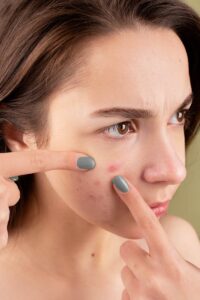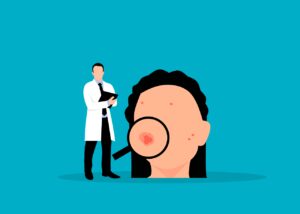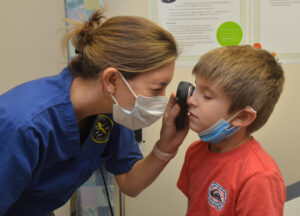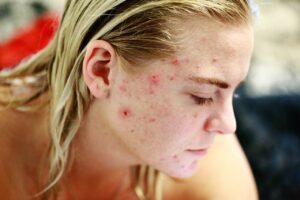Guide to Treating Acne: Tips from Aesthetician
Acne is a common skin condition that affects people of all ages, but particularly teenagers and young adults. It is characterized by the presence of pimples, blackheads, whiteheads, cysts, and nodules on the skin, primarily on the face, neck, chest, and back. Understanding the causes and types of acne is crucial in devising an effective treatment plan. Dermatologists, aestheticians, and medical aestheticians play a vital role in treating acne and helping individuals achieve clear, healthy skin.
Understanding Acne

Acne is a multifactorial skin condition that involves the hair follicles, oil glands, and pores. The primary cause of acne is the excess production of oil (sebum) by the sebaceous glands. When dead skin cells and oil clog the hair follicles, it creates an environment for the acne-causing bacteria to thrive. This leads to inflammation, infection, and the formation of different types of acne lesions.
Types of Acne
There are various types of acne, including blackheads, whiteheads, papules, pustules, nodules, and cysts. Each type of acne presents differently on the skin and may require a tailored approach for effective treatment. Aesthetician and medical aesthetician expertise is crucial in identifying the specific type of acne and formulating an individualized treatment plan.
Hormonal Factors
Hormonal changes can profoundly impact the development and severity of acne. Fluctuations in hormone levels, particularly during puberty, menstrual cycles, pregnancy, and menopause, can stimulate the sebaceous glands to produce more oil, leading to hormonal acne breakouts. Understanding the hormonal factors contributing to acne is fundamental in determining the most suitable treatment options.
Causes of Acne
Several factors contribute to the development of acne, including genetics, hormonal imbalances, certain medications, dietary choices, and environmental factors. By understanding the root causes of acne, professionals can devise comprehensive treatment plans to address the underlying issues and provide long-term solutions for managing and treating acne.
Treating Acne
When it comes to treating acne, there are various professional treatments as well as home remedies that can be employed to address the condition effectively.
Professional Treatments
Professional treatments for acne often involve interventions by specialists such as dermatologists, aestheticians, and medical aestheticians. These professionals are equipped with the knowledge and tools to provide comprehensive care for acne. Some professional treatments for acne include chemical peels, laser therapy, photodynamic therapy, and medical-grade skin care products. These treatments are designed to target different aspects of the acne, such as reducing oil production, unclogging pores, and controlling bacterial growth. In severe cases, dermatologists may also prescribe medications such as benzoyl peroxide or salicylic acid to manage stubborn acne.
Home Remedies
While professional treatments are effective, there are also various home remedies that can help in the management of acne. These include over-the-counter topical treatments, such as acne spot treatments, as well as natural remedies like tea tree oil or aloe vera. Making lifestyle adjustments, such as maintaining a healthy diet, managing stress, and practicing good skincare habits, can also play a significant role in preventing and managing acne breakouts.
Laser and Light Therapy
Laser and light therapy have gained popularity for treating acne due to their ability to target acne lesions and promote clearer skin. Different types of light therapy, including blue light and infrared light, can be used to kill acne-causing bacteria and reduce inflammation. Moreover, laser and light therapy can also help in diminishing acne scars and improving overall skin texture. These treatments are best administered by licensed estheticians or medical aestheticians, who can tailor the therapy to suit individual skin types and conditions.
Seeking Professional Help
When dealing with acne, seeking professional help is essential for effectively addressing the condition. Consulting a dermatologist is a crucial first step in developing a tailored treatment plan. Dermatologists are medical doctors who specialize in diagnosing and treating skin conditions, including acne. They can provide expert guidance on the best course of action, which may include prescription medications, advanced treatments, and skincare recommendations.
Choosing an aesthetician with expertise in treating acne can also be beneficial. Aestheticians are skincare specialists who are trained in providing various facial treatments and can offer personalized skincare routines to target acne. They can perform treatments such as extractions, chemical peels, and facial massages to help improve the appearance and health of the skin.
Understanding the distinction between licensed estheticians and medical aestheticians is important when seeking professional help for acne treatment. While licensed estheticians focus on cosmetic skincare treatments, medical aestheticians are trained to provide advanced skincare procedures under the supervision of a medical professional, such as a dermatologist. Medical aestheticians may offer more intensive treatments and work closely with dermatologists to address severe acne cases.
Advanced Acne Treatments
For individuals with persistent or severe acne, advanced treatments may be necessary to achieve clearer skin. Photodynamic therapy is a promising option for treating acne. This advanced treatment involves the application of a photosensitizing agent to the skin, followed by exposure to specific light wavelengths. The combination of the photosensitizer and light activates a reaction that targets and destroys acne-causing bacteria and reduces oil production, leading to improvement in acne symptoms.
Treating hormonal acne requires specialized approaches that address the underlying hormonal imbalances contributing to the breakouts. Dermatologists and medical aestheticians may recommend tailored treatments, such as oral medications or hormone-regulating therapies, to manage hormonal acne effectively. By addressing the root cause of hormonal acne, individuals can experience long-term relief and improved skin health.
Combination therapies involving multiple treatment modalities, such as topical medications, laser therapy, and skincare routines, can provide comprehensive solutions for acne. These combined approaches can target different aspects of acne, including inflammation, sebum production, and bacterial growth, resulting in more effective and long-lasting results for individuals dealing with moderate to severe acne.
FAQ’s
Q: What are the common causes of acne?
A: Acne can be caused by a variety of factors, including hormonal changes, genetics, certain medications, and excess oil production.
Q: How can I effectively treat hormonal acne?
A: Treating hormonal acne may require a personalized approach. It’s best to consult with a licensed esthetician or board-certified dermatologist who can recommend treatments such as hormonal therapy or prescriptions to treat the underlying hormonal imbalances.
Q: Can aestheticians treat severe cases of acne?
A: Aestheticians are trained to treat various forms of acne, including cystic acne, acne nodules, and acne vulgaris. However, for severe cases, it’s important to seek the expertise of a dermatologist who can provide advanced treatments such as photodynamic therapy or intense pulsed light (IPL) treatments.
Q: What is the role of photodynamic therapy in treating acne?
A: Photodynamic therapy is a treatment that uses a photosensitizing agent and light to target and destroy acne-causing bacteria. It can be an effective option for individuals with acne-prone skin or those who may not respond well to other treatments.
Q: How does light treatment help in clearing acne?
A: Light treatments, such as laser or intense pulsed light (IPL) therapy, work by targeting the bacteria on the skin’s surface and reducing inflammation. These treatments can help clear acne and improve the overall appearance of the skin when performed by trained and experienced professionals.
Q: What are the best skincare tips for managing acne?
A: To manage acne, it’s essential to maintain a consistent skincare routine, avoid harsh products, and consider using non-comedogenic and oil-free skincare products. Additionally, adopting a healthy lifestyle, managing stress, and staying hydrated can support overall skin health.
Q: Can acne be exacerbated by certain factors?
A: Yes, factors such as stress, hormonal fluctuations, certain medications, and the use of comedogenic skincare products can exacerbate acne. It’s crucial to identify and address these triggers as part of an acne management plan.
Q: How does hormonal acne differ from other types of acne?
A: Hormonal acne is often characterized by deep, cystic lesions that appear primarily on the lower half of the face and neck. This type of acne is associated with hormonal imbalances and may require specific treatment approaches to effectively manage it.
Q: Can estheticians provide treatments for acne nodules?
A: Yes, licensed estheticians are trained to provide targeted treatments for acne nodules, which are deep, painful lesions that form beneath the skin’s surface. However, for more persistent or severe cases, a dermatologist’s expertise may be necessary.
Q: How can I prevent acne breakouts?
A: Preventing acne breakouts involves maintaining good skincare habits, avoiding pore-clogging products, and addressing potential triggers such as stress and hormonal fluctuations. Regular exfoliation and professional skincare treatments can also help prevent and manage acne.




